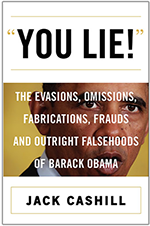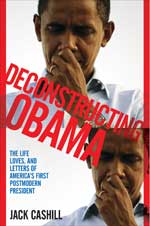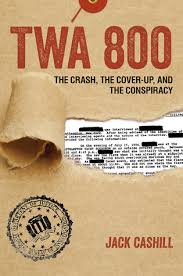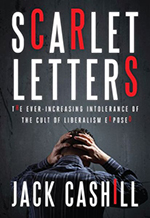President Obama Should Free Officer Slager
_____
Order Jack Cashill's latest book, TWA 800: The Crash, the Cover-Up, and the Conspiracy
______
Order Jack Cashill's book,
Scarlet Letters
___
Get your copy of Jack Cashill's book, "You Lie!"

___
Get your copy of Deconstructing Obama

___
Jack Cashill's book:
Hoodwinked: How Intellectual Hucksters have Hijacked American Culture
© Jack Cashill
AmericanThinker.com- December 8, 2016
As a kid, when I got up in the morning, there was no more welcome a sight than a box of donuts on the kitchen table. Of course, I liked to eat donuts, but that was not the reason I welcomed their arrival. No, what the donuts told me was that while I was sleeping my father had arrived home safely.
My father was a police officer in Newark New Jersey, a city in which bad things routinely happen to good cops. As South Carolina police officer Michael Slager has learned the hard way, today, bad things can happen to good cops just about anywhere.
The lead sentence in a CNN report on Monday of this week tells us why Slager is in a jam: “A prosecutor vowed Monday to retry a white former police officer charged with killing an unarmed black motorist in North Charleston, South Carolina, after the jury failed to reach a verdict following 22 hours of deliberation” (italics added).
The insertion of racial qualifiers would lead one to believe that the incident had something to do with race. It did not. CNN just wished it had. A media willing to roast white cops who do everything right—Ferguson’s Darren Wilson comes to mind—yearn to condemn those cops who have done something wrong.
Slager would appear to be one such cop. The state of South Carolina certainly thinks so. By placing him in the cell next to Dylan Roof, the man who wantonly murdered nine black churchgoers, they signaled to the community that Slager was just another racist killer, equally deserving of a life in prison.
Unasked in the rush to judgment, however, was a fundamental question, the answer to which affects not only Slager’s future but also that of every other police officer in America. Simply put, should we imprison otherwise good cops for making bad decisions?
Nothing he had done prior to the Scott shooting led anyone to think of Slager as anything but a good cop. A Coast Guard veteran with five years on the NCPD and the married father of an infant son, Slager pulled Walter Scott over for a taillight violation on a Saturday morning, told Scott politely why he had done so, and returned to his vehicle to write Scott a warning ticket:
As he did so, Slager saw Scott bolt from his own car and run off. He immediately pursued him. “In my mind at that time was, people don’t run for a broken taillight. There’s always another reason,” Slager testified in his own defense.
Slager chased the heavy-set Scott before catching up to him in a vacant lot. He yelled “stop” and then “Taser! Taser! Taser!” With a warning given, he fired both sets of electric darts. After the second shot, Scott fell, and Slager tried to subdue him while calling for back-up.
Scott resisted, grabbing the stun gun and ripping it out of Slager’s hand. “After observing the two men struggle on the ground and hearing the sound of a Taser gun,” said witness Feidin Santana, “I began filming the altercation with my cell phone.”
The video picked up as Scott broke free of Slager’s grasp. “I knew I was in trouble,” Slager testified. As Scott started to run away, Slager fired multiple times, killing Scott. Said Slager, “I fired until the threat was stopped as I was trained to do.”
In recent years, other police officers have been tested much as Slager was. A January 2009 incident captured on video served as something of a prototype for those that followed. Following a chaotic early morning brawl on a Bay Area Rapid Transit (BART) train in Oakland, BART officer Johannes Mehserle, thinking he had grabbed his Taser, shot and killed Oscar Grant, 22. After several nights of rioting, prosecutors charged Mehserle with murder, and Hollywood made a movie celebrating Grant’s life.
In October 2014, Chicago police officer Jason Van Dyke shot and killed knife-wielding Laquan McDonald from ten feet away. McDonald, 17, had been suspended from school and arrested multiple times before the shooting. Van Dyke, a fourteen-year veteran of the CPD, has a wife and two children. When the video of the shooting surfaced a year after the fact, protests followed, and Van Dyke was promptly charged with first-degree murder and held, initially at least, without bail.
In September 2016, Tulsa sheriff’s deputy Betty Shelby was promptly charged with first-degree manslaughter for fatally shooting motorist Terence Crutcher. A nine-year veteran with a clean record, Shelby told interviewers she feared for her life. An investigator thought otherwise, telling the media Shelby became “emotionally involved to the point that she overreacted.” If convicted, Shelby is facing a minimum of four years in prison, a maximum of life.
In cases like these, Slager’s included, the defense often relies on a 1985 Supreme Court ruling. The ruling posits that if the officer “has probable cause to believe that the suspect poses a threat of serious physical harm, either to the officer or to others, it is not constitutionally unreasonable to prevent escape by using deadly force.”
In Slager’s case, Scott had already shown his willingness to attack a police officer and resist arrest. In the second or two after Scott broke free, Slager had to decide whether Scott posed a threat to those in the neighborhood.
A more useful long-term defense for all four of the officers cited above—and in all comparable cases--would be an appeal to the equal protection clause of the Fourteenth Amendment. The amendment insists that no state “deny to any person within its jurisdiction the equal protection of the laws.” These officers have been denied that protection for two reasons, one more obvious than the other.
Let us presume for a minute that each of these officers, in a moment of extraordinary stress, made a lethal error. Mehserle clearly did. “Oh, my God!” he repeated over and over after shooting Grant. Fatal accidents happen in many other professions as well—medicine, the military, firefighting, construction—but only cops face prison for their mistakes.
Today, of course, the odds that a cop will be imprisoned increase dramatically if the cop is white and the deceased is black as was true in every case cited above. If the DOJ were to run a “disparate impact” study on judicial outcomes, the results would be obvious beyond debate: white cops do not receive anything like equal protection under the law. The threat of riots makes the judicial fate of all accused cops more precarious still.
The police are aware of their legal vulnerability. In Chicago, in October 2016, a large black man badly beat Parta Huff, a white female officer. “As I was at the hospital last night visiting with her,” said black police superintendent Eddie Johnson, “she looked at me and said she thought she was going to die and she knew that she should shoot this guy but she chose not to because she didn’t want her family or the department to have to go through the scrutiny the next day on the national news.”
Not only are the police suffering from this mayhem, but so also are the residents of cities like Chicago that are caught in the blowback from the so-called “Ferguson effect.” When the police pull back—and who can blame them?--the gangsters move in. So far this year, Chicago has experienced more murders than New York and Los Angeles combined.
If there is one man responsible for provoking this madness it is Barack Obama. Oscar Grant supporters in Oakland began their riots two weeks before his inauguration. After every incident since, Obama has used his power and prestige to incite the protestors.
One very good way for Obama to undo the damage of his presidency would be to pardon Michael Slager and explain why. I know, don’t tell me, and maybe one day pigs will fly.

Jack Cashill’s newest book, TWA 800: The Crash, the Cover up, the Conspiracy can now be ordered at Amazon.



